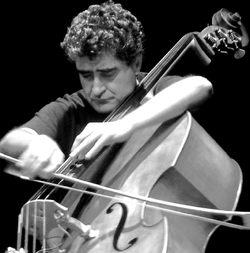Renaud Garcia-Fons was born in 1962 near Paris to parents from the Catalonia region of northeastern Spain, and was introduced to music at age five, taking up the piano and classical guitar. As a young man, he studied the double bass at the Paris Conservatony of Music, performing in its orchestras and refining his knowledge of music theory and performance.
He also became the private student of François Rabbath, and through him gained a profound knowledge of the double bass as well as an introduction to the Syrian roots of Rabbath's compositions; and as a member of Le Big Band Roger Guerin, he performed side-by-side with some ofthe most renowned ofjazz drummers, including Kenny Clarke and Sam Woodyard.
By age 21, Renaud had won performance competitions held by the cities of Paris and Aubervilliers, and was awarded a diploma by the French Cultural Minister as Professor of Double Bass.
From this point fonlvard, he began to work independently, allowing his adventurous spirit to liberate him from the technical limitations of his instrument in favor of greater freedom to improvise, and to explore music at the crossroads ofjazz, traditional, and contemporany music.
Ten years into thisjourney, he decided to add a fifth string to his bass, enabling possibilities well beyond the idea of the bass as an accompanying instrument, particularly the option to be one of an ensemble's improvising voices. Combining this innovation with his con arco and pizzicato techniques, he reached an unprecedented level of performance, and became known as the "Paganini of the double bass?
As a member of the Orchestre des Contrebasses and later of the Orchestre National de Jazz directed by Claude Barthélemy, his knowledge of jazz and improvisation deepened, and brought him into direct contact with many leading European and American jazz musicians. The art ofimprovisation became a central element in his artistic vision. There are multiple sources for his musical inspiration -he feels as close to the Flamenco tradition, which he has transposed for the double bass, as to the music of the Mediterranean and Orient. This has led him to collaborations with Pedro Soler, Vicente Pradal, and Carmen Linares, as well as Angélique lonatos (Greece), Cheb Mami (Algeria), Dhafer Youssef (Tunesia), Huong Tanh (Vietnam), and Kudsi Ergüner (Turkey).
For several years he has enjoyed a fruitful relationship with Matthias Winckelmann, the producer and founder of the German label Enja Records, and has released seven recordings: Legendes, Alboréa, Oriental
Bass, Fuera (with accordianist Jean-Louis Martinier), Navigatore (for 20 musicians), Entremundo (for trio) and, most recently, Arcoluz, a live DVD-CD recording of a trio concert given in Schloss Elmau, Germany.
Renaud has led a variety of ensembles including the Oriental Bass band, Navigatore 5tet and 8tet, and has given solo concerts whose title is Pilgrim. Over the past three years, he's performed most frequently with his trio, consisting of guitarist Antonio Ruiz and percussionist Pascal Rollando.
In addition to leading his own groups, Renaud collaborates with other artists. On September 11th in 2002, he performed with Claire Antonini, a Persian Tar player, at New York's Metropolitan Museum of Art in a special event sponsored by UNESCO in commemoration ofthe World Trade Center tragedy of 2001.
He is a member of the trio led by the Vietnamese-French guitarist Nguyen Le, and recently broadened his collaborative work to include a duo with French guitarist Sylvain Luc; a trio with flamenco guitarist Gerardo Nunez and percussionist Cepillo; and a quartet focused on Indian music with Anindo Chatterjee (tablas), Ken Zuckerman (sarod), and Keyvan Chemirani (zarb).
In parallel with his career as a performer, Renaud has worked as a composer, fulfilling commissions as well as his desire to broaden the repertoire of his performing ensembles. At the Scene Nationale de Sceaux in October 2004, he presented World Chamber Music, a piece for string quartet, double bass, and two instruments of Eastern origin: the bansuri, aflute prominent in northern Indian music; and the riq, a small tambourine equipped with cymbals that is played in all Arab music.
A commission for the anniversany of the Entente FrancoEcossaise offered another opportunity to bring together artists of different worlds. For this occasion Renaud composed a piece in five movements for his trio and seven soloists from the Scottish Chamber Orchestra. Tutti orchestral sequences alternate with more intimate orchestrations, giving individual chamber orchestra members an opportunity to join the trio in improvisation. Renaud and the Orchestra gave the work's premiere in late October 2004 and, the following month, performed it in France at the Festival de la Cóte d'Opale and at the Grand Theatre de Dijon.
In 2007, Opera de Lyon gave Renaud carte blanche to program five evenings of concerts. He chose to perform solo, in duos with Sylvain Luc and Claire Antonini, in trio, and gave the premiere performance of repertoire from his soon-to-be-released quartet recording, Linea del Sur, where the trio isjoined by accordionist David Venitucci and singer Esperanza Fernandes.
Later that year, Renaud returned to the U.S. with trio performances in California, then began 2008 with the European premiere of Paquito D'Rivera's concerto for clarinet, bass, and symphony orchestra in Spain's Canany Islands, a composition written in tribute to Cuban bassist Cachao. The summer of 2008 brought Renaud's first visit to Canada, where the trio performed in jazz festivals across the nation -- including Toronto, Ottawa, Vancouver, Montreal, and Quebec - and his first appearance at the North Sea Jazz Festival.





